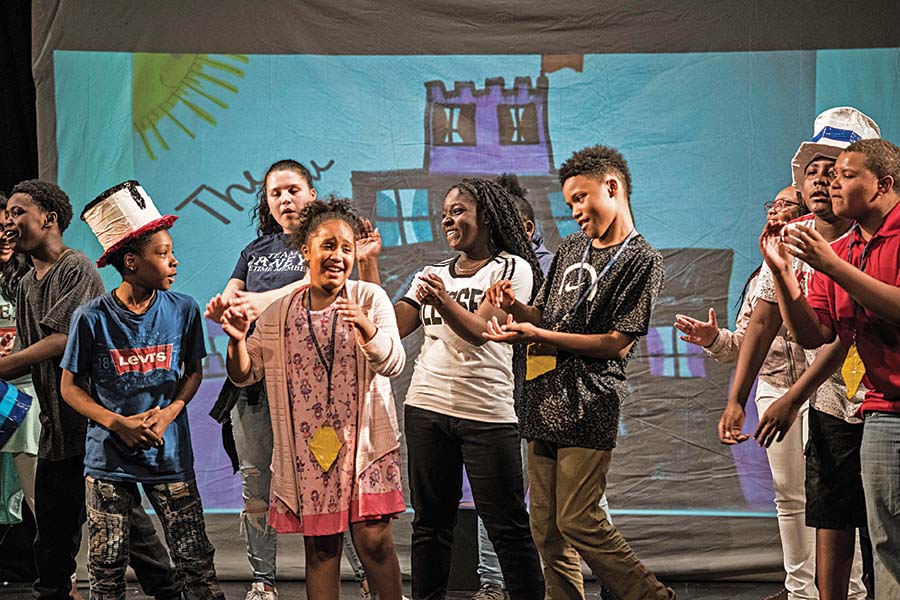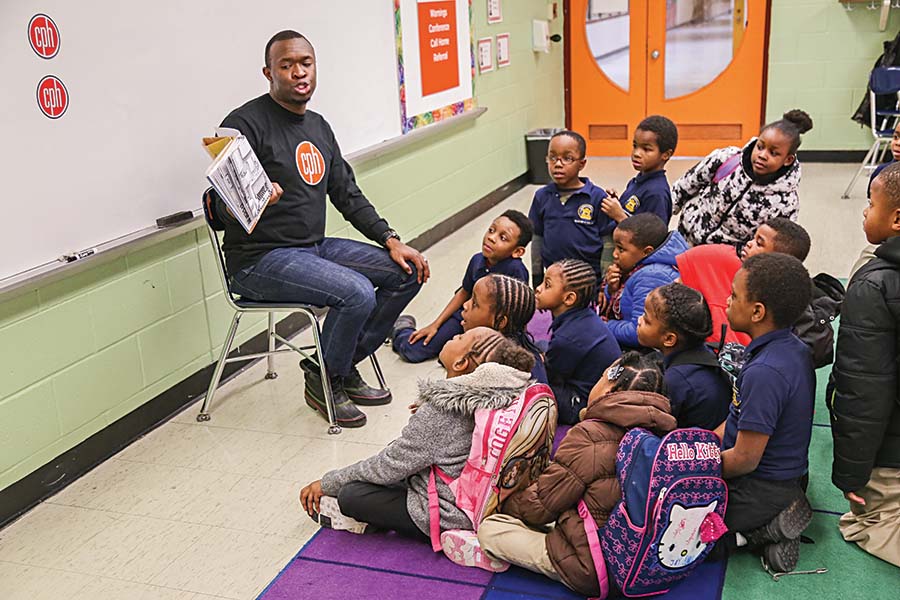Elsewhere in the October 2018 issue of American Theatre we cover engagement and education programs that theatres have created mostly around their onstage season programming, much of it designed to both serve and expand their regular audiences. The following listing features programs by which theatres work directly with schools in their area to supplement not only students’ arts education but many aspects of their core curriculum as well.
Cleveland Play House
According to the Cleveland Metropolitan School District’s CEO, the largest barrier to Cleveland students’ academic success is low levels of social emotional learning (SEL). Cleveland Play House, which partners with the district to meet student needs, wanted to do something about that. Supported by a Cleveland Department of Education grant, CPH’s Compassionate Arts Remaking Education (CARE) program uses theatre to improve students’ SEL. CARE also set out to address the root of the problem: adverse childhood experiences and chronic trauma.
“The CARE classroom allows a safe space for students to interact with each other around those topics through a theatrical lens,” said CPH education director Pamela DiPasquale. “It encourages resilience, pushes for mastery, but celebrates all successes, large and small. Most importantly, the CARE classroom meets the students where they are without judgement, then helps them to find the language they need to define their own emotions, and, with patience, learn to regulate those emotions.”
Inspired by psychologist Robert Plutchik’s “basic emotions,” each unit begins with a “pre-show,” introducing an emotion with quick writing exercises. In lessons, students explore a text portraying that emotion (“Act I”), get the text on its feet (“Act II”), and end with an empowering “CAREfirmation” statement (“Curtain Call”). Texts for middle schoolers include CARE-commissioned monologues specifically written for Cleveland students by such contemporary playwrights as Idris Goodwin.
One of CARE project manager Thomas Kazmierczak’s favorite memories is of last November’s CARE Share, when he witnessed Bolton Elementary School students in their first student-led event. With shouts of, “We’ve got this, Mr. K,” they demonstrated CARE class exercises, presented poetry, and led written and verbal affirmations. At the end of the night, BES’s Principal Juliet King told him “CARE works, it really works—thank you.”
“At that moment, I knew CARE was not just a job or a curriculum, but a vocation within my heart and the scholar’s heart,” Kazmierczak said.
Hartford Stage
The in-school residencies run by this Connecticut company teach classroom content through theatre techniques. Their programs, under the title of Connections, are meant to let students emotionally connect to what they are learning in preschool, elementary school, middle school, and high school.
The main Connections program is a pre-reading residency that stimulates third through 10th graders’ interest in works of literature, of which students receive copies when the program concludes. Built upon suspense points that make students excited to find out what happens next, the program has a speaking and listening focus and provides students with the theatrical vocabulary to participate in dialogues with characters, to create tableaux of scenes from the book, to be good audience members for their classmates, and to write and read their own monologues from the character’s point of view. By the end of the week, students understand the story’s context, feel invested in the characters, and usually can’t wait to read the book.
“Theatre is a powerful tool for building empathy and engaging people in stories, so it’s a natural fit in the classroom,” said Hartford Stage’s director of education Jennifer Roberts. “It’s also a very active, engaging way to learn, and really draws in students with many different learning styles. For Hartford Stage, it’s a way to extend the excitement and immediacy of theatre into schools and classrooms, and help kids fall in love with stories.”
The program has reached more than 60,000 students in almost 50 communities across the state. There are currently 24 books taught in Connections, including picture books, Shakespeare, and non-fiction books with topics ranging from the environment to financial literacy. Hartford Stage’s other programs include Innovations, which teaches science through theatre to kindergarteners through eighth graders, and an abbreviated version of Connections called Foundations for preschoolers.
La Jolla Playhouse
The in-school education programs at this Southern California theatre prioritize arts integration in the classroom and co-teaching methods for teachers’ professional development. These include Arts Academy, Title I: Learning Through the Arts, and InterACT-ion. Teaching artists in the Arts Academy and Title I programs work with elementary and middle school teachers to make the arts part of core curriculum subjects like history and math, using theatre exercises to build a classroom ensemble and increase retention of classroom material. InterACTion, meanwhile, provides students with leadership and mentoring on youth safety, positive life choices, good citizenship, and academic success. It culminates in original monologues based on students’ personal life experiences, using theatre “as a vehicle to engage and empower young people to reflect on their lives,” according to associate director of education and outreach Julia Cuppy.
“An aspect of our mission at La Jolla Playhouse is to provide creative opportunities for the leading artists of today and tomorrow,” Cuppy said. “Our education department sees young people as the artists of tomorrow, and in all of our programs we engage and empower young people to practice theatrical skills that build their creative capacity, which ultimately helps them grow into well-rounded human beings adept at using empathetic communication skills in their lives.”
Over the years, programming has expanded from single site offerings to county-wide initiatives, thanks to partnerships with community and educational organizations. Title I reaches Title I schools in the San Diego Unified School District, and InterACTion collaborates with the San Diego Police and County Probation Department’s STAR/PAL program, and other civilian professionals.
La Jolla reaches more than 30,000 students and over 2,000 teachers each year and has been recognized as an official “Partner in Education” by the Kennedy Center since 1999. This allows the education staff to attend yearly events about educational trends and resources, making the company’s theatre instruction rooted in the best practices of current educational pedagogy.

Teatro Milagro
Portland, Ore.’s Teatro Milagro has produced bilingual touring productions since its first Hispanic Cultural Festival in 1989. It’s the only company in the Pacific Northwest to do so, and its shows have become resources for learning both Spanish and English, teaching history’s untold stories, and tackling difficult themes.
“Theatre can portray relevant issues in a way that is more interactive than other teaching methodologies,” said tour manager Ajai Terrazas Tripathi, and in Milagro’s case it crucially extends beyond the “dominant Anglocentric curriculum.” As Tripathi put it, “Spanish-speaking students’ eyes light up when they hear the language of their families represented. Non-Spanish-speaking students develop an ear for interpretation and quickly pick up nonverbal cues. Though stories may be culturally specific, the themes are universal, as all students share the world despite perceived differences.”
Milagro offers accompanying workshops taught by the troupe’s teaching artists, who combine popular education and Theatre of the Oppressed with image theatre that leads to reflections and discussions. Milagro also teaches a STEAM-focused curriculum, UNIDAD, through workshops and residencies with a textbook on identity, family, community, and the environment.
STEAM is part of many Milagro shows, including Bi- by Georgina Escobar, an adaptation of Edwin Abbott’s Flatland that addresses identity and symmetry in the world. Bi- premiered in spring 2018 and continues in the 2018-19 touring season, which also includes ¡Corre! ¡Corre! by Tripathi, Super Ana! by Olga Sanchez, and a new show in February: Judge Torres by Milta Ortiz, about Judge Xiomara Torres, the first Latina Multnomah County judge. Torres herself will be involved with the play.
Over the past 30 years, Milagro has been a space for bilingual artists. “In the early days in Oregon, it was very white, and to have bilingual actors meant a lot of searching for people with natural talent that could be nurtured, and so many people came out of the ‘School of Milagro,’” artistic director Dañel Malán said.
Alums include NYC director/playwright Rebecca Martinez and actor Maya Malán-Gonzalez of Cara Mía and Teatro Luna.
Dad’s Garage
Dad’s Garage’s 10-week outreach improvisation program began as an extracurricular program in the metro Atlanta area, with teaching artists reaching a handful of high schools, and has become an in-classroom tool that allows any teacher to become an improv teacher. The program aims to teach life skills to students across the state.
“We believe that access and exposure to the arts is incredibly useful for high schoolers, whether it’s to show them a potential career path or just to encourage the love and appreciation of art for the rest of their lives,” said Ed Morgan, the associate artistic director in charge of education at Dad’s Garage. “Improv is an incredibly useful medium for that because it’s so interactive, fun and low-cost. Improv also relies on concepts like agreement, confidence, acceptance of failure, collaboration and empathy; those are really important for kids at that stage in life.”
The program adheres to ELA and Theatre Arts GPS standards, allowing educators to easily incorporate improv into lesson plans and reporting requirements. Teachers are provided with tips on guiding the exercises and relevant codes to their lesson plans, as well as short videos explaining key concepts and exercise demonstrations.
Though the program is now accessible to anyone who wants to try it, Dad’s Garage is still happy to send instructors to schools for sessions if the school requests it and they’re located at a reasonable distance from the theatre.
“We had a great relationship with a school here in Atlanta that donated space to us for our regular classes at night just because we were doing an outreach session with them during the day,” Morgan said. “Having improv as a part of education means a lot to the community. We hope that this new version can get it out there even further.”

Children’s Theatre Company
Neighborhood Bridges is a critical literacy program established by Children’s Theatre Company (CTC) of Minneapolis. Founded in 1997 by University of Minnesota literature professor Jack Zipes and CTC artistic director Peter Brosius, it uses creative drama for social and individual transformation in preschoolers (Early Bridges) and kindergarteners through high schoolers (Neighborhood Bridges).
“We need more programs where we listen to children deeply in the classroom and beyond,” said Maria Asp, CTC’s Bridges program director. “Critical literacy provides space for learners to think about their thinking. We aim to practice skills of questioning text that will transfer outside the classroom.”
According to Asp, critical literacy is an orientation to reading and listening that involves an understanding of how texts position readers, how readers position texts, and how texts are positioned within social, cultural, historical, and political contexts. It asks questions of power, voice, and visibility.
Lessons begin with the Fantastic Binominal (borrowed and developed from Gianni Rodari’s Grammar of Fantasy), in which the teaching artist and students begin thinking and imagining stories through free association. Then students engage in storytelling, creative drama exercises, and writing games. At the season’s end, participating schools perform original work for each other.
Bridges’ programming continually evolves and expands. CTC is currently working with American Muslim organizations and community members to create curriculum that counters Islamophobia. The program also has a national scope, with six national conferences to date and sites in 19 cities across the U.S., including the Performing Arts Center at Purchase College, Adventure Stage Chicago (ASC), Yocum Institute for Arts Education, Fulton Theatre, and Children’s Theatre of Charlotte.
According to ASC education manager Anne McNamee-Keels, Bridges synthesizes ASC’s social mission with its artistic one, giving ASC a standard of practice for all schools they partner with. “We see Neighborhood Bridges as an opportunity for students not to just to learn to building blocks of theatre, but to hone collaboration and critical thinking skills that can benefit them as students and as citizens,” she said.


